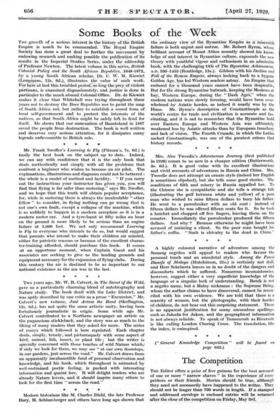Modern historians like M. Charles Diehl, the late Professor Bury,
M. Schiumberger and others have long ago shown that
the ordinary view. of the Byzantine Empire as a -Miserable failure is both unjust and untrue. Mr. Robert Byron, whose brilliant account of Mount Athos recently showed his know. ledge of and interest in Byzantine culture, expounds the new theory with youthful irigour and enthnsiasin in an admirable beak, with the challenging title of The Byzantine Achievemint, A.D. 330-1453 (Routledge, 15s.). Gibbon with his DeCline and Fall of the Raman Empire, always looking, back to a bygone Golden Age, has ledWegtein readers astray. An Empire that endured for is thousand years cannot have been despicable, But for the strong Byzantine bulwark, keeping the Moslems at bay, Weitern Europe, during the " Dark AgeV," when the modern nations were slowly forming, would have been over- whelmed by Asiatic hordes, as indeed it nearly was by the Huns. Mr. Byron's description of Constantinople as the world's centre for trade and civilization is accurate and fas- cinating, and it is sad to remember that-the Byzantine hold over Eastern Europe and Western Asia was ultimately weakened less by Asiatic attacks than by European treachery and lack of vision. The Fourth Crusade, in which the Latins sacked Constantinople, was one of the greatest crimes that history records.
*








































 Previous page
Previous page